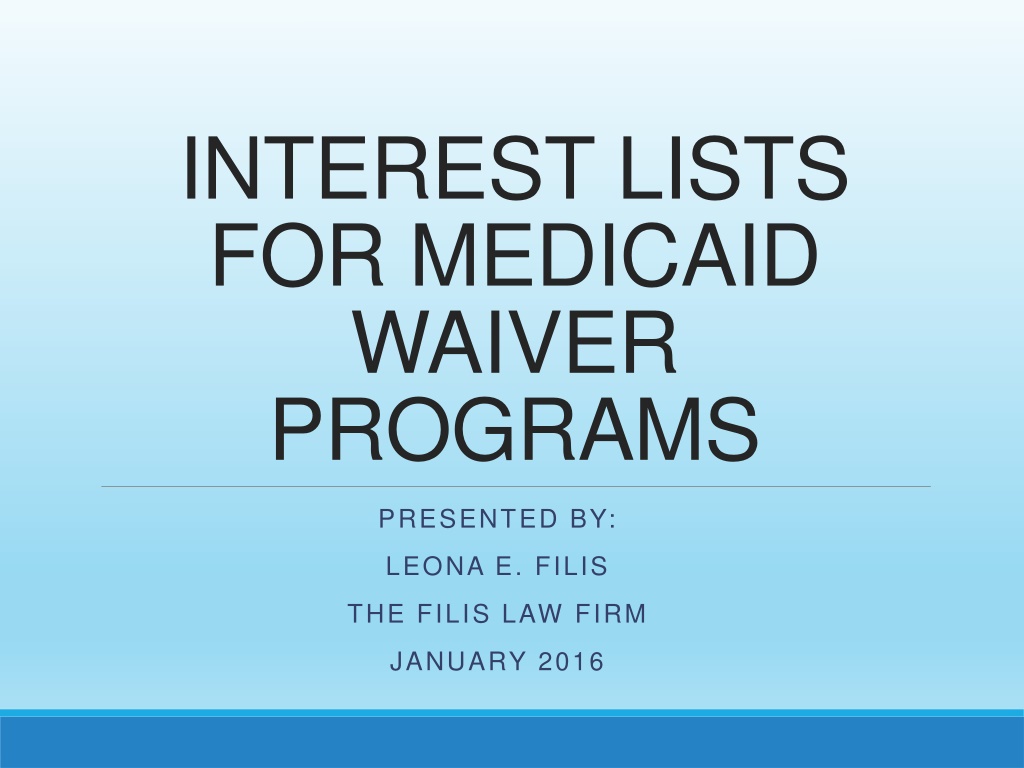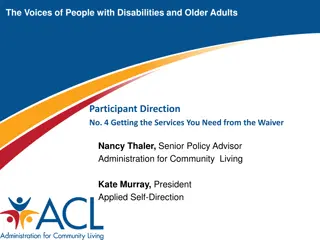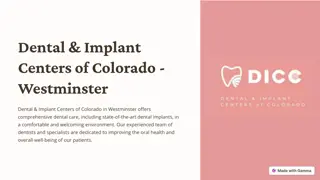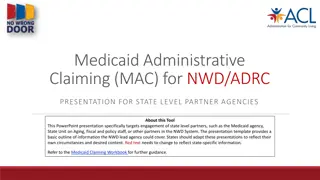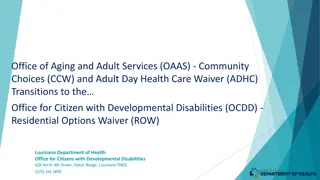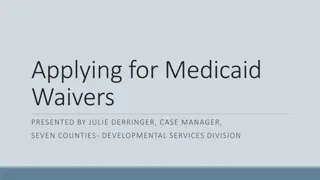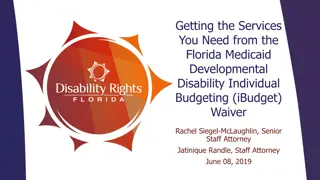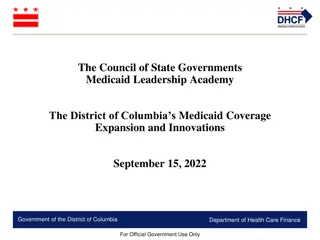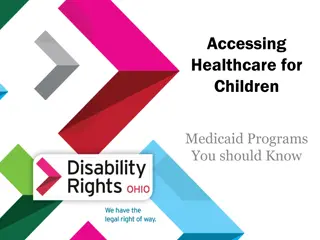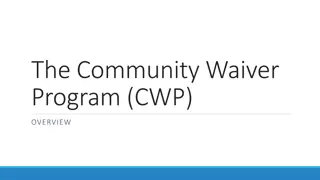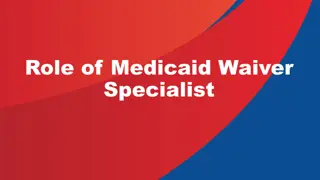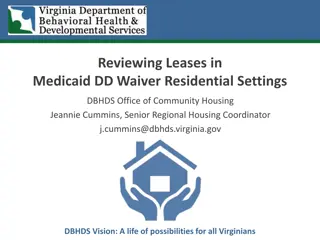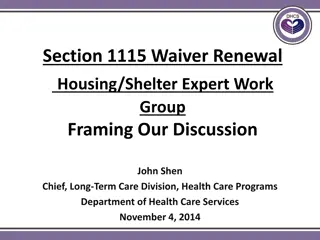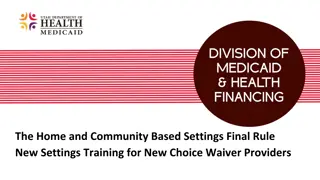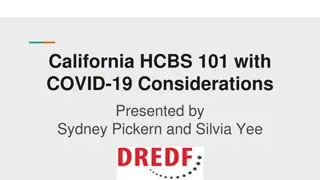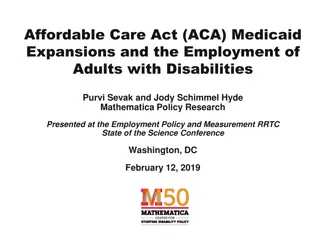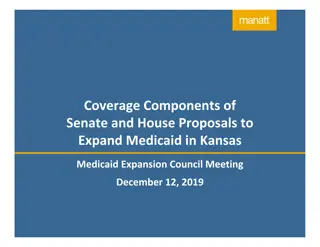Understanding Medicaid Waiver Programs for Individuals with Disabilities
Medicaid Waiver Programs provide community-based services for children and adults with disabilities, offering an alternative to institutional care. Eligibility is based on factors such as income, need, and resources, with specific programs like CLASS, HCS, and MDCP available. The long wait times and the transition for students aging out of school highlight the importance of these programs in providing crucial support and therapies for individuals with disabilities.
Download Presentation

Please find below an Image/Link to download the presentation.
The content on the website is provided AS IS for your information and personal use only. It may not be sold, licensed, or shared on other websites without obtaining consent from the author. Download presentation by click this link. If you encounter any issues during the download, it is possible that the publisher has removed the file from their server.
E N D
Presentation Transcript
INTEREST LISTS FOR MEDICAID WAIVER PROGRAMS PRESENTED BY: LEONA E. FILIS THE FILIS LAW FIRM JANUARY 2016
What are Medicaid Waiver Programs? Children and adults with disabilities can be eligible for programs that offer services community based settings rather than in institutions. For eligibility, factors that are considered are the disabled individual s level of income, need, and resources. In most cases the age of the individual or the parents income and resources are not factors. Unfortunately the wait time to receive these benefits can be several years. in the home and
Aging out of public school Once a student with disabilities ages out of school, therapies that were received on campus are lost too. A Medicaid Waiver Program can assist a by providing services and therapies for children and adults with disabilities.
6 Medicaid Waiver Programs 1. Community Living Assistance and Support Services (CLASS) 2. Home and Community-Based Services (HCS) 3. Texas Home Living (TXHml) 4. Community-Based Alternatives (CBA, in some areas Star+Plus) 5. The Medically Dependent Children Program (MDCP) 6. Deaf-Blind with Multiple Disabilities Program (DBMD)
The Long Wait August 2015 Summary of Interest List Releases Item CLASS DBMD HCS 1 MDCP Totals Previous Biennium Counts As of August 31, 2013 48,181 544 67,044 27,036 142,805 Enrolled 4 635 117 3,056 1,303 5,111 Released/Remo ved from Interest List 2 Denied/Declined /Withdrawn 4 1,118 395 1,897 11,464 14,874 Pipeline 840 207 955 1,945 3,947 Total Releases This Biennium3 Since September 1, 2013 2,593 693 5,908 14,676 23,870 Added This Biennium New Requests 9,987 338 14,945 9,867 35,137 Current Interest List Counts As of August 31, 2015 54,083 221 72,984 20,537 147,825
Code of Federal Regs, Title 42, 435.1010 and Department of Aging and Disability Services DADS Definition of a related condition: A severe and chronic disability that is due to cerebral palsy or epilepsy or any other condition, other than mental illness, found to be closely related to mental retardation because the condition results in impairment of general intellectual functioning or adaptive behavior similar to that of individual with mental retardation, and requires treatment or services similar to those required for individual with mental retardation. The condition must manifest before 22 years of age and is likely to continue indefinitely. The individual will have substantial functional limitations in 3 or more of following: self-care, understanding and use of language, learning, mobility, self-direction, and capacity for independent living.
Examples of a related condition Conditions specific to childhood with codes: Psychoses with Origin Specific to Childhood (299) 299.0 Autistic disorder (childhood autism; infantile psychosis; Kanner s syndrome) 299.1 Childhood disintegrative disorder 299.8 Other specified pervasive developmental disorders(Asperger s disorder, atypical childhood psychosis; borderline psychosis of childhood) 299.9 Unspecified pervasive developmental disorder (pervasive developmental disorder NOS) Conditions originating in the Perinatal Period:(760-779) 760.71 Fetal alcohol syndrome 767.4 Injury to spine and spinal cord 768.5 Severe birth asphyxia 771.0 Congenital rubella 779 Other and ill-defined conditions originating in the perinatal period
Examples of a related condition Conditions that are due to Congenital Anomalies with codes: 741.0 Spina bifida with hydrocephalus 741.9 Spina bifida without mention of hydrocephalus 756.59 Conradi syndrome 758.0 Down s syndrome 758.1 Patau ssyndrome 758.2 Trisomy 18 (Edwards syndrome) 758.3 Autosomal deletion syndromes 758.6 Gonadal dysgenesis(Turner s syndrome) 758.7 Klinefelter s syndrome 758.89 Other conditions due to chromosome anomalies (Ring 18) 758.9 Conditions due to anomaly of unspecified chromosome 759.5 Tuberous sclerosis 759.81 Prader-Willi syndrome 759.82 Marfan syndrome 759.83 Fragile X syndrome
Examples of a related condition Conditions of the Nervous System and Sense Organs (320-389) 320.9 Meningitis due to unspecified bacterium 323 Encephalitis, myelitis, encephalomyelitis 331.81 Reye s syndrome 331.89 Cerebral ataxia 331.9 Cerebral degeneration, unspecified 332.0 Paralysis agitans(Parkinson s disease) 332.1 Secondary Parkinsonism 333.4 Huntington s chorea 340 Multiple sclerosis 359.0 Congenital hereditary muscular dystrophy 359.1 Hereditary progressive muscular dystrophy 369.4 Legal blindness, as defined in U.S.A. 377.7 Disorders of visual cortex 377.75 Cortical blindness 389.0 Conductive hearing loss 389.1 Sensorineural hearing loss
CLASS-Community Living Assistance & Support Services Program (DADS 1-877-438-5658) CLASS provides home and community-based services to people with related conditions as a cost-effective alternative to placement in an intermediate care facility for persons with intellectual disability or a related condition (ICF-ID/RC). (manifested before age 22). DADS Form 8662. Related conditions include autism, muscular dystrophy, cerebral palsy and spina bifida. Cannot be on another Medicaid Waiver Program. Must be Medicaid eligible for SSI. Parents income does not apply for a child. Talk to a lawyer about Special Needs Trusts to protect your child s eligibility to receive benefits.
C.L.A.S.S. services include: Adaptive aids and Medical supplies Case management Minor home modifications Physical and Occupational Therapy Speech and language pathology Psychological and behavior support services (BCBA to consult and design an ABA program) Respite Care Specialized therapies Dental and dental sedation Behavior Support
Specialized Therapies covered by C.L.A.S.S. Specialized therapies--Services to promote skills development, maintain skills, decrease inappropriate behaviors, facilitate emotional well-being, create opportunities for socialization, or improve physical and medical status that consist of the following: (A) aquatic therapy; (B) hippotherapy; (C) massage therapy; (D) music therapy; (E) recreational therapy; and (F) therapeutic horseback riding.
Specialized Therapies covered by C.L.A.S.S. Aquatic therapy--A service that involves a low-risk exercise method done in water to improve an individual's range of motion, flexibility, muscular strengthening and toning, cardiovascular endurance, fitness, and mobility. Hippotherapy--The provision of therapy that: (A) involves an individual interacting with and riding on horses; (B) is designed to improve the balance, coordination, focus, independence, confidence, and motor and social skills of the individual; and (C) is provided by two service providers at the same time, as described in 45.803(d)(11) of this chapter (relating to Qualifications of DSA Staff Persons).
Specialized Therapies covered by C.L.A.S.S. Massage therapy--The provision of massage therapy as defined in Texas Occupations Code, Chapter 455. Music therapy--The use of musical or rhythmic interventions to restore, maintain, or improve an individual's social or emotional functioning, mental processing, or physical health. Occupational therapy--The provision of occupational therapy, as described in Texas Occupations Code, Chapter 454.
Therapies covered by CLASS Physical therapy--The provision of physical therapy, as defined in Texas Occupations Code, Chapter 453. Recreational therapy--Recreational or leisure activities that assist an individual to restore, remediate or habilitate the individual's level of functioning and independence in life activities, promote health and wellness, and reduce or eliminate the activity limitations caused by an illness or disabling condition. Therapeutic horseback riding--The provision of therapy that: (A) involves an individual interacting with and riding on horses; and (B) is designed to improve the balance, coordination, focus, independence, confidence, and motor and social skills of the individual.
CLASS - Who, What, & How Who: Talk to a Program Provider-- a DSA or a CMA. What: IPP--Individual program plan. A written plan documented on a DADS form that describes the goals and objectives to be met by the provision of each CLASS Program service on an individual's IPC that: (A) are supported by justifications; (B) are measurable; and (C) have timelines. How: Choose the Consumer Directed Services Option Be the boss!
HCS-Home and Community Based Services HCS program provides individualized services to people living with their family, in their own home or in other community settings such as small group homes. In order to qualify for this program, a person MUST have a diagnosis of an Intellectual Disability - SEE Harris Center IQ below 76 NOTE: Must be Medicaid eligible for SSI. Parents income does not apply for a child.
HCS Services include: Case Management Counseling and Therapies Residential Assistance (such as Supported Home Living, Supervised Living, Foster/Companion Care, Residential Support) Respite Care Day Habilitation Nursing Services Dental Care Minor Home Modifications Adaptive Aids
HCS and TxHml contact information Harris County Residents 713-970-7799 Fort Bend County Residents 281-342-0090 Waller County Residents 281-342-0090
MDCP-Medically Dependent Children Program (DADS 1-877-438-5658) MDCP provides services to support families caring for children and young adults who are medically dependent and to encourage the de-institutionalization of children in nursing care facilities. The applicant must be under 21. NOTE: Must be eligible for SSI or meet institutional resource-to-income limits (not considering parents income).
MDCP Services include: Respite Care Adaptive Aids Adjunct Support Services Minor Home Modifications Transition Assistance Services Financial Management Services
CBA-Community Based Alternatives Star+Plus (713-692-1635) Medicaid (800-633-4227) This program provides home and community- based services to an individual who is age 21 and older that would qualify for a nursing care facility. These services are provided as cost- effective alternatives to placement in a nursing care facility. NOTE: Must be Medicaid eligible for SSI. Parents income does not apply for a child. Talk to an attorney about Special Needs Trusts.
CBA Services include: Medical Supplies Adult Foster Care Assisted living/residential services Home delivered meals Emergency response services Occupational Therapy Dental Services Speech or language pathology services Respite care services Nursing services Personal assistance services
DBMD- Deaf-Blind w/Multiple Disabilities Program (DADS 1-877-438-5658) DBMD provides home and community-based services to people who are deaf-blind with multiple disabilities as a cost-effective alternative to institutional placement. The program focuses on increasing opportunities to communicate and interact with their environment. Must be eligible for SSI and Medicaid benefits under SSI. Need ID/RC assessment DADS Form 8662.
DBMD Services Include: Adaptive aids and medical supplies Behavior support services Case management Minor home modifications Nursing services Physical and Occupational therapy Respite care Specialized nursing services Speech, hearing and language therapy Supported employment
TxHml: Texas Home Living To Be Eligible for TxHml, you MUST: 1. Live in your own home or family home 2. Have a diagnosis of an intellectual disability or related condition with an IQ of 75 or below. 3. Be eligible for Medicaid (this waiver will consider family income) 4. Not required to have intensive one to one supervision to prevent dangerous behavior. 5. Not be enrolled in another DADS Medicaid Waiver such as CLASS or MDCP
TxHml Services include: Community Living Supports Day Habilitation Supported Employment Respite Professional & Technical Supports Behavioral support Physical & Occupational Therapy Dental Treatment Speech
The Harris Center (713-970-7070) The Harris Center for Mental Health and IDD (formerly MHMRA) is the Harris County authority agency on mental health and intellectual disability/developmental disabilities. This agency coordinates and serves all county residents diagnosed with mental health, intellectual and developmental disabilities. We serve the "priority population meaning adults who are diagnosed with severe and persistent mental illness, children with serious emotional disturbances, and people diagnosed with moderate to severe intellectual disability. The Harris Center does consider income in determining rates for services; however, they will provide services to any county resident.
Texana (281-342-0090) Texana is the county authority agency on mental health and intellectual/developmental disabilities in the following six counties: Ft. Bend, Austin, Waller, Colorado, Wharton, Matagorda. To Qualify for services you must Be a resident of one of the six counties served And meet one of the following: Diagnosed with intellectual disability Diagnosed with a pervasive developmental disorder including Autism Nursing Facility residents who are eligible for specialized services for intellectual disability pursuant to Section 1919(e)(7)of the Social Security Act Children who are eligible for services from the Division of Early Childhood Intervention Services through the Department of Assistive and Rehabilitative Services(DARS)
SUCCESS! Your loved one is on the Interest Lists now what?
Groups Learn about resources in your area and chat with similarly-situated parents. Yahoo Groups Facebook Groups Meet-ups Check for local sensory-friendly events at places like The Children s Museum, Sky High, and at movie theaters.
DID Evaluation A DID Evaluation is a Determination of Intellectual Disability Evaluation that must be completed to be eligible for services through MHMRA/Texana. THE DID EVALUATION IS FREE. The waiting list is 6-8 months for this evaluation. To schedule a DID evaluation contact MHMRA or Texana to request an evaluation. Someone will call you back to ask more specific questions and schedule the evaluation. Any services that are offered to a family will come at a cost depending on the financial situation of the family. The income of the family unit does factor into the cost of the services, but not as to whether the child can get services.
What Documentation to bring to DID evaluation? Bring copies of the following: Proof of Residency in the county(i.e. a utility bill or tax statement) Proof of the family s income (i.e. parents paycheck stubs, IRS W-2 form) Number of family members in the home (i.e. social security cards of all household members) Proof of insurance coverage (i.e. Private insurance card, Medicaid Card, SSI Benefits) Proof of Guardianship (i.e. child s birth certificate, if guardian, bring copy of current guardianship letter from court, power of attorney documents) Copies of Previous Evaluation Reports (i.e. if individual receives Special Education services, a copy of their Full Individual Evaluations (FIE) and their Comprehensive Individual Assessments (CIA s). You can request this from your child s school. Also, any copies of evaluations done by psychologists or other medical agencies) ***If you do not bring this information, the evaluation appointment will be rescheduled***
Respite Care Vouchers Respite Care Program 1-877-393-1090 offers help to caregivers Vouchers issued by the program can be used to pay for: Help in the home Adult daycare services Certified individuals outside the home to provide care while the caregiver is away.
Protect your childs benefits The government offers support to disabled individuals with programs such as SSI (Supplemental Security Income). Once your child is receiving SSI, do not lose the income-based benefit by receiving assets or cash from loving and well-meaning family members. Direct transfers or payments to your child on SSI can cause disqualification. Plan ahead and get a Third Party Special Needs Trust / Supplemental Needs Trust. Have a will drafted to meet your family s long-term needs. Trust funds could be used for summer camps, medical bills not covered by Medicaid, computers, and many items that enhance the quality of your child s life. The trust will have its own taxpayer identification number and file annual fiduciary tax returns. There is no pay back provision.
Protect your childs benefits 1st Party or Self-Settled Special Needs Trust In the event your child is to receive funds from a personal injury settlement, obtain a 1st Party Special Needs Trust. Such trusts have a payback provision for Medicaid. When the beneficiary passes away, any money life in the trust has to be used to pay the State of Texas back for any Medicaid money spent on the beneficiary s behalf.
Check your status and stay on the Interest Lists until you are contacted by DADS Contact from DADS is typically through the mail once the disabled individual is on the list. If you move, contact the DADS and MHMRA/Texana to update your contact information. If you do not respond timely to the DADS letter for your interview, you may lose your child s opportunity to receive benefits.
Coming off the Lists You are still your child s strongest advocate. Your will be given many choices to choose from when it is time to select CMAs and DSAs. Decide if Consumer Directed Services Option is best for you.
Consumer Directed Services Option (a) After initial orientation of the employer by the CDSA and before additional FMS may be provided by the CDSA, the CDSA must receive from the employer a completed copy of Form 1735, Service Agreement between the Employer and the Consumer Directed Services Agency, and required attachments. (b) Before the CDSA pays an eligible service provider, the CDSA must obtain a completed original of the DADS provided Service Acknowledgment Between a Service Provider and the Consumer Directed Services Agency, and required attachments, for: (1) each employee of the employer; (2) each contractor retained by the employer; and (3) each vendor retained by the employer, if required in instructions for completion of the DADS Service Acknowledgment Between a Service Provider and the Consumer Directed Services Agency.
Consumer Directed Services Recruit, hire and train your own employees and backup employees (including family, friends or neighbors). Set wages and benefits for your employees based on a service budget created with the help of your service planning team. Set schedules and submit timesheets for your employees. Select a Consumer Directed Services Agency (CDSA) to: train you to hire and manage employees, process your timesheets and payroll, process receipts and invoices, and act as your agent to pay federal and state employment taxes
Programs where you can use CDS: Consumer Managed Personal Assistance (CMPAS) Community Attendant Services (CAS) Community Living Support Services (CLASS) Deaf Blind with Multiple Disabilities (DBMD) Family Care (FC) Home and Community-based Services (HCS) Medically Dependent Children Program (MDCP) Primary Home Care (PHC) Texas Home Living (TxHmL)
Services accessible through the CDS Option: Habilitation Cognitive rehabilitative therapy Employment assistance Nursing services Occupational therapy Physical therapy Respite care Speech and language pathology Support consultation Supported employment
Get HIPP! Once your child is on Medicaid, independently or through one of the Medicaid Waiver Programs, your employer-based insurance could be covered by the HIPP program. Check with www.GetHIPPTexas.com for more information.
Thank you for your attention! Leona E. Filis The Filis Law Firm, PC Leona.Filislawfirm@gmail.com www.filislaw.com www.houstonspecialneedsattorneys.com This presentation is for informative and educational purposes only and is not legal advice or an endorsement of programs or groups included herein.
